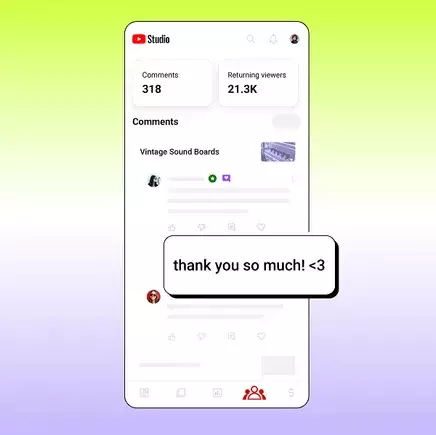The digital landscape is continuously evolving, with social media platforms like YouTube at the forefront of these changes. Recently, YouTube made headlines by announcing a live experiment involving AI-generated reply suggestions aimed at streamlining creator interactions with their audience. While this initiative may seem appealing on the surface, it raises significant concerns about the human element of social media and its implications for genuine engagement.
YouTube has introduced AI-enhanced comment reply suggestions that will assist creators in crafting responses to viewer comments more efficiently. The platform claims that these AI-generated responses will reflect the creator’s unique tone and style, drawing from their previous interactions. This technology may appear similar to the auto-complete features found in various email clients, which can be a helpful tool for those overwhelmed by the volume of messages they receive. However, the application of AI in this scenario seems to tread a fine line between convenience and authenticity.
On one hand, one can argue that AI-generated replies could considerably reduce the time and effort creators expend on managing fan interactions. For popular creators who receive an avalanche of comments, these suggestions might facilitate engagement, fostering a sense of community and encouraging further dialogue among followers. From this perspective, automatisms in engagement could be beneficial, particularly in maximizing audience interaction while minimizing creator fatigue.
However, the darker side of this innovation becomes evident when considering the potential loss of authentic communication. The essence of social media lies in its capacity for genuine interaction; when responses become automated, the human connection that should underpin these exchanges risks eroding. Should the digital conversation devolve into a cycle of AI-generated replies, what remains of true, heartfelt communication? The central question emerges: does convenience justify the sacrifice of authenticity?
The fear of losing the “social” in social media is palpable, and previous experiences with automated messaging systems have often left users feeling devalued. Automated replies, whether in direct messages or comments, tend to lack the nuance and empathy that come with human interaction. As YouTube ventures deeper into the realm of automation, one wonders whether creators will inadvertently foster a sense of artificial engagement with their audience, ultimately alienating genuine followers seeking real conversations.
This automation trend is not unique to YouTube. Other major platforms, such as Meta, have introduced tools for creators to construct AI-driven chatbots that emulate their style and voice. While these tools may enhance interaction efficiency, the transition toward this method of communication raises pressing ethical concerns. Encouraging artificial responses dilutes the value of individual engagement and undermines the core purpose of social networking—a human connection.
The Role of AI in Social Media: Time-Saving vs. Time-Wasting?
While proponents of the technology cite the efficiency and responsiveness AI can offer, detractors question the necessity of these offerings in contexts that inherently rely on human interaction. Is automation truly the answer to the increasing workload faced by many creators, or does it exacerbate the problem by fostering hollow interactions that could alienate audiences?
The platforms’ promotion of AI-driven solutions raises broader implications about the direction of social media. Are we witnessing a genuine evolution in how we communicate, or are we inadvertently paving the way for a culture characterized by artificiality and detachment? Unquestionably, as content creators and viewers alike adapt to these tools, the crucial balance between engagement and authenticity must remain at the forefront of discussions surrounding the future of social media.
As YouTube’s experiment unfolds, creators and users alike must remain vigilant in evaluating the impact of AI on their interactions. The emergence of AI-generated replies presents both opportunities and challenges. Still, the overarching goal should always be to preserve the social fabric that makes these platforms vibrant and engaging. Ultimately, technology should serve as an enabler of genuine connections rather than a replacement. In this fast-paced digital age, the true value of social media lies in our ability to connect meaningfully as humans, not merely as content producers and consumers. The road ahead must be navigated with caution, ensuring that we do not lose sight of what makes us human in our quest for efficiency.


Leave a Reply
You must be logged in to post a comment.